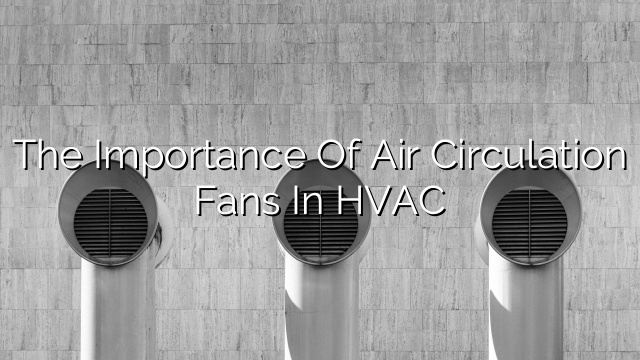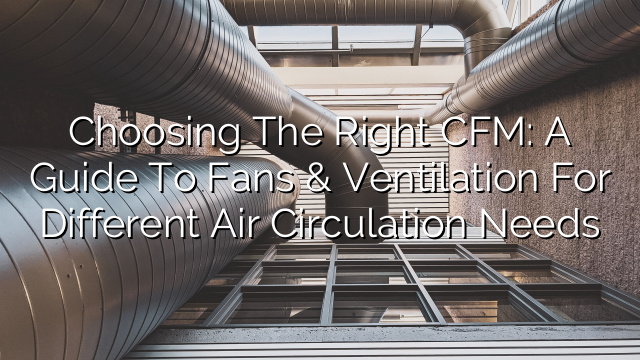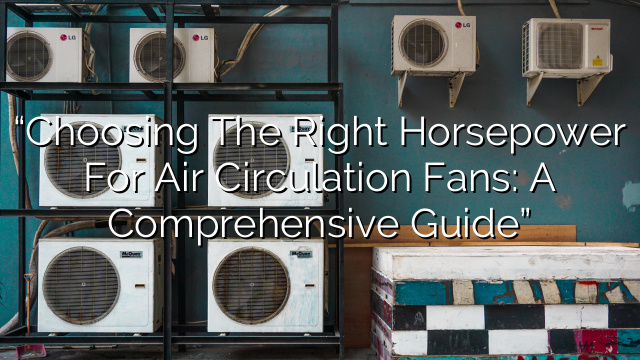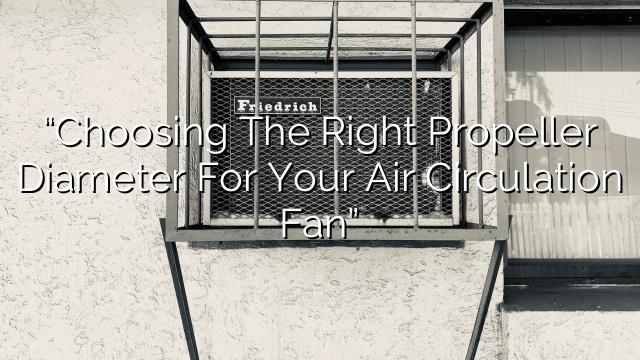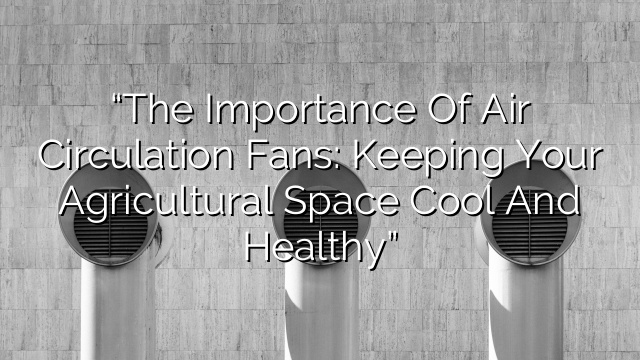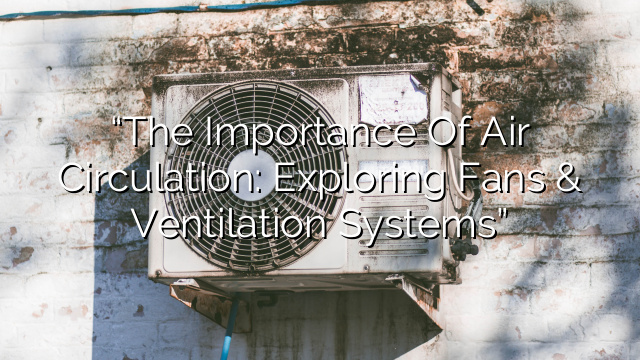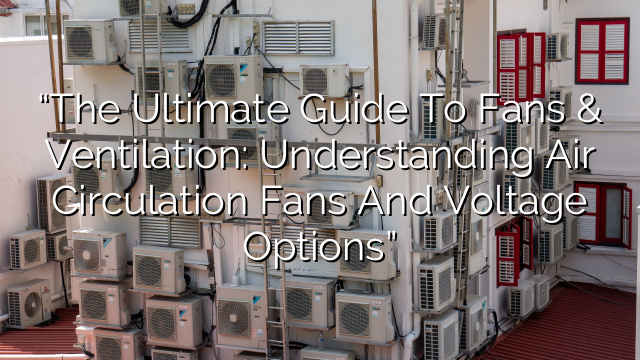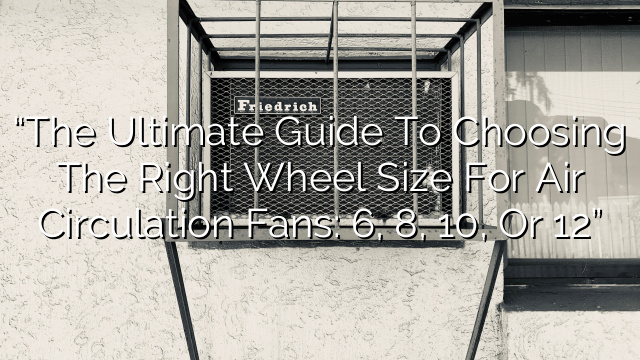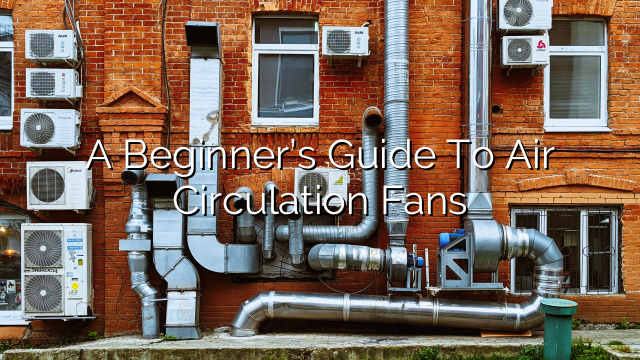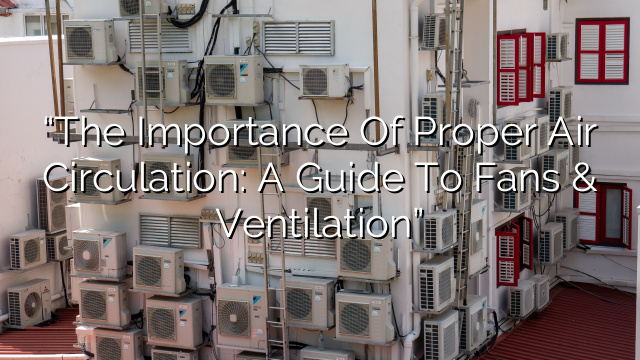The HVAC (Heating, Ventilation, and Air Conditioning) system plays a crucial role in maintaining a comfortable indoor environment. While most people are familiar with the importance of the heating and cooling components of an HVAC system, the role of air circulation fans is often overlooked. In this blog post, we will explore the significance of air circulation fans in HVAC and how they contribute to enhancing the overall functionality of the system.
Why is air circulation important?
Proper air circulation is essential for several reasons. Firstly, it helps to distribute conditioned air evenly throughout the space, ensuring that every corner of the room receives an adequate amount of heating or cooling. This prevents hot or cold spots and creates a comfortable environment for the occupants.
Furthermore, efficient air circulation helps to regulate humidity levels by preventing the buildup of moisture or stagnant air. This is especially important in areas prone to high humidity, as excess moisture can lead to the growth of mold and mildew, causing health issues and damage to the property.
Additionally, air circulation plays a vital role in maintaining indoor air quality. By continuously moving and filtering the air, circulation fans help to remove pollutants, such as dust, allergens, and volatile organic compounds (VOCs). This improves the overall air quality and ensures a healthier environment for the occupants.
The role of air circulation fans in HVAC
Air circulation fans, also known as air handlers or blowers, are responsible for moving air through the HVAC system and distributing it to different areas of a building. They are typically installed in the ductwork and operate in conjunction with the heating and cooling equipment.
Here are a few key roles that air circulation fans play in HVAC:
1. Enhancing energy efficiency
By ensuring proper air circulation, the fans help to improve the overall energy efficiency of the HVAC system. When conditioned air is distributed effectively, it reduces the workload on the heating or cooling equipment, allowing them to operate more efficiently. This can lead to significant energy savings and lower utility bills.
2. Improving comfort
Proper air circulation is essential for maintaining a comfortable indoor environment. The fans help to prevent temperature stratification by circulating warm or cool air evenly throughout the space. This eliminates hot or cold spots and ensures consistent comfort for the occupants.
3. Enhancing air filtration
Air circulation fans play a crucial role in the filtration process. As the air moves through the HVAC system, it passes through filters that trap dust particles, pollen, and other airborne contaminants. The fans help to draw air through the filters, ensuring that the pollutants are effectively removed from the indoor air.
4. Improving humidity control
Efficient air circulation helps to regulate humidity levels in the indoor environment. The fans help to remove excess moisture by circulating the air, preventing the formation of condensation and reducing the chances of mold and mildew growth. This is particularly important for areas with high humidity or during humid seasons.
How to ensure efficient air circulation with fans
To ensure efficient air circulation with fans, it is essential to consider the following factors:
1. Proper fan sizing
It is crucial to select fans that are properly sized for the space they are intended to serve. Oversized or undersized fans can negatively impact the air circulation and energy efficiency of the HVAC system. Consulting with a professional HVAC technician can help determine the appropriate fan size for optimal performance.
2. Fan placement and direction
The placement and direction of the fans play a significant role in their effectiveness. Fans should be strategically positioned to ensure proper air distribution throughout the space. They should be placed in a way that allows them to draw air from the occupied zone and supply it evenly to all areas.
3. Regular maintenance
Regular maintenance of the HVAC system, including the fans, is vital to ensure optimal performance and efficiency. This includes cleaning or replacing air filters, checking fan blades for dust or debris accumulation, lubricating fan motors, and inspecting belts or pulleys for wear and tear.
Frequently Asked Questions (FAQs)
Q1: Can air circulation fans replace the need for air conditioning?
A1: No, air circulation fans alone cannot replace the need for air conditioning. While fans can help create a cooling effect by circulating air, they do not actually cool the air like an air conditioner. Air conditioning systems are designed to remove heat from the air, lowering the temperature, and providing cooling comfort.
Q2: Do ceiling fans contribute to air circulation?
A2: Yes, ceiling fans are an excellent addition to HVAC systems, as they can enhance air circulation and improve comfort. Ceiling fans help to create a slight breeze, making occupants feel cooler without lowering the room temperature. They should be used in conjunction with air conditioning or heating systems to maximize energy efficiency.
Q3: Can air circulation fans improve indoor air quality?
A3: Yes, air circulation fans can contribute to improving indoor air quality. By continuously circulating the air, they help to remove airborne pollutants and bring fresh air into the space. However, it is essential to use high-quality air filters and regularly clean or replace them to ensure effective filtration.
Q4: Can air circulation fans be noisy?
A4: While air circulation fans can produce some noise, modern fans are designed to operate quietly, providing minimal disturbance. Noise levels can vary depending on the fan type, size, and speed. It is advisable to select fans that are known for their quiet operation and consider noise-reducing features for improved comfort.
Q5: Can I install air circulation fans myself?
A5: It is generally recommended to hire a professional HVAC technician to install air circulation fans, especially if they are integrated into the existing HVAC system. Professionals have the knowledge and expertise to ensure proper installation, sizing, and integration with other HVAC components, ensuring optimal performance and safety.
In conclusion, air circulation fans are an essential component of HVAC systems. They play a crucial role in distributing conditioned air, enhancing energy efficiency, improving comfort, and promoting indoor air quality. By considering fan sizing, placement, and regular maintenance, it is possible to ensure efficient air circulation and maximize the benefits of these fans.

